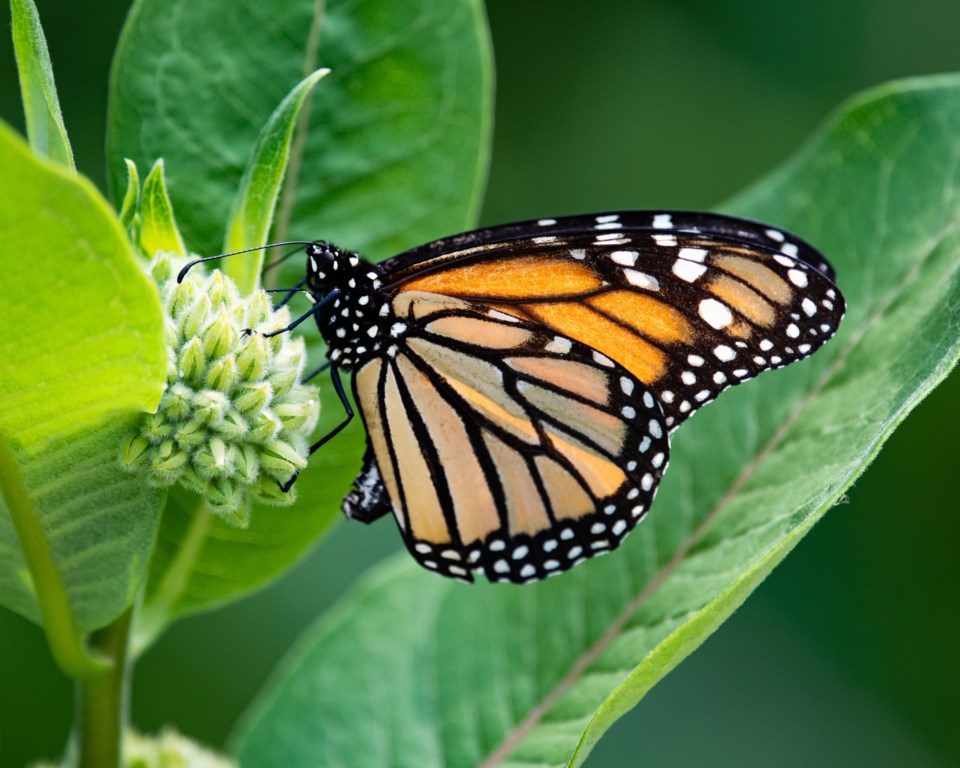OrilliaMatters welcomes letters to the editor at [email protected]. Please include your daytime phone number and address (for verification of authorship, not publication).
The monarch butterfly is a tropical species that migrates north into our temperate zone to feed and reproduce on the abundance of its host plant, milkweed, in our area.
They need to return to Mexico to overwinter in the south. Monarch populations have declined by over 80 per cent in the past 20 years with Mexican overwintering population numbers fluctuating from year to year but with an overall decline.
The monarch season starts in the south in early March as females reach Northern Mexico and Texas to lay their eggs for the first generations. These females are the same ones that left Ontario in late August and early September to migrate south to spend the winter. It depends on how early the spring is each year for Northern Mexico and Texas since females need to wait until milkweed plants have started their season before laying eggs. This can happen early in March or, some years, in late March.
Monarchs take approximately one month to complete a full generation — three to five days as an egg, nine to 14 days as a caterpillar, eight to 13 days as a chrysalis — therefore, 20 to 32 days to become an adult, around one month. Some adults arrive in Ontario in early May but most by late May. Generations in the north start around early June, earlier in southern Ontario. In early July, we observe lots of larva on milkweed and again in early August. Adults hatching in early to mid-August are the monarchs that make their way south to Mexico in September, arriving on the wintering ground in early November.
Life cycle can be variable in length depending on weather and plant growth and does not entirely line up with the months of the calendar. However, in early July and August, there should be lots of mature caterpillars feeding on our three species of milkweed. This summer, I checked large stands of common and swamp milkweed from late June to early August and found very few caterpillars on these host plants.
Some monarch lovers want to help and have taken it on themselves to collect caterpillars on milkweed during the summer and rear them in captivity before releasing the adults when they emerge from the pupa cases. Some have collected over 200 caterpillars over the summer to rear them, thinking they are doing the right thing and congratulating themselves in media releases.
However, recent studies have shown that captive rearing causes changes to gene expression or health and leads to genetic differentiation. The result is lowered fitness relative to those hatched in the wild.
It also affects their migration bearings with captive adults not migrating. This practice of rearing monarchs in summer is not helping monarch populations but, in fact, hurting them. A few years ago, a university report gave the lack of milkweed plants as the reason for the decline. I didn’t believe it back then and I certainly don’t believe it today since more people are planting milkweeds in their gardens and there are lots of healthy plants but with few or no caterpillars feeding on them.
More frequent and severe storms and cutting of oyamel fir trees in wintering habitats impact populations. However, the greatest impact is the use of herbicides and pesticides, especially in the Ohio corn belt area of migration, where it washes into puddles after rains, which are visited by the monarchs.
Let’s not rear any more monarch caterpillars in captivity since it appears that these studies are correct and will soon be proven. However, we should not use any poisonous chemicals for herbicides and pesticides since they not only kill insects like monarchs but all forms of life they contact and destroy the balance of nature.
Bob Bowles
Orillia
